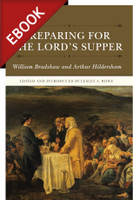
Bradshaw, William, & Hildersham, Arthur
Description
Preparing for the Lord’s Supper presents practical instruction from two Puritans.
William Bradshaw’s contribution explains the dangers of taking Communion unworthily and how to prevent it. His work concludes with a set of questions to aid Christians in self-examination as they prepare for the Lord’s Supper. Bradshaw’s piece is supplemented with Arthur Hildersham’s thorough catechetical tool for understanding and properly partaking of the sacred meal. These treatises exemplify what Puritan ministers taught to common people in ordinary, obscure towns and villages as they prepared to take the Lord’s Supper. They are a similar challenge to us today to prepare ourselves thoughtfully and prayerfully before coming to the Lord’s Table.
In the broadest sense, they supply a helpful guide for proving our faith through self-examination. As Bradshaw says, “The duty of trying and examining a man’s self is of use to the best of Christians.”
Contents
Introduction
A Preparation to the Receiving of the Sacrament of Christ’s Body and Blood By William Bradshaw by William Bradshaw
Dedicatory Epistle
To the Reader
Part 1: Showing What a Dangerous Sin It Is to Receive This Sacrament Unworthily
1. Preparation in General, and the Apostles’ form Thereof
2. The Author and Institutor of This Sacrament
3. The First Administrator of This Sacrament
4. When This Sacrament Was Instituted
5. The Religious Manner of Instituting and Administering This Sacrament
6. Outward Signs and Elements of This Sacrament
7. Things Signified by the Signs Aforesaid
8. The End and Use of This Sacrament in Respect of the Communicant
9. The End and Use of This Sacrament in Respect of Others
10. What It Is to Be Guilty of the Body and Blood of Christ
11. By What Means in Receiving This Sacrament Men Become Guilty of the Body and Blood of Christ
12. Why Unworthy Receivers Are Guilty of the Body and Blood of Christ
Part 2: Showing How to Prevent the Dangerous Sin of Profaning This Sacrament
1. The Method of This Second Part
2. The Trial of Ourselves in General
3. The Trial of Our Faith by the Grounds Thereof
4. The Trial of Our Faith by the Object or Matter Thereof
5. The Trial of Our Repentance
6. New Obedience and the Trial Thereof
7. The Persons That Are to Make This Trial
8. The Continuance in Trial till We Find That We Seek For
9. The Curse That Follows the Neglect of the Trial Aforesaid
10. The Special Signs and Tokens of the Aforesaid Curse in the Church of Corinth
Part 3: A Brief Form of Examination
Q&A 1–75
The Doctrine of Communicating Worthily in the Lord’s Supper By Arthur Hildersham by Arthur Hildersham
To the Reader
Q&A 1–100
Endorsements
“Those questions and answers wherein Hildersham has comprised the doctrine of the Lord’s Supper ... have been of singular good use to many poor souls for their worthy preparation to that ordinance. And in very deed they do more fully furnish a Christian to that whole spiritual duty than any other, in any language that I know, in so small a compass.”
—John Cotton (1628) on Hildersham’s Doctrine of Communicating Worthily in the Lord’s Supper
“Bradshaw’s book, and that part of it more especially wherein are laid down certain marks and signs of faith and repentance, has been, as far as I am able to deem, the only outward instrument[al] means of my conversion, through the gracious cooperation of God’s Spirit working powerfully and efficaciously upon my heart in the reading thereof.”
—Thomas Foster, a seventeenth-century Bedfordshire mercer, on Bradshaw’s A Preparation to the Receiving of the Sacrament of Christ’s Body and Blood
About the Editor
Lesley A. Rowe is an associate fellow in the history department of the University of Warwick. She has written several journal and magazine articles and is the author of The Life and Times of Arthur Hildersham: Prince among Puritans.
About the Authors
William Bradshaw (1570–1618) graduated from Cambridge University and quickly became a target for anti-Puritan authorities within the Church of England. He spent most of his ministry as a household chaplain for Alexander and Katharine Rediche. He preached regularly at the local church of Stapenhill and was also engaged with Hildersham and others in the preaching exercises at Burton-upon-Trent and Ashby. In addition to his devotional writings, Bradshaw published controversial works on justification, Puritanism, episcopacy, separatism, and baptism. He died in London in 1618 at age forty-eight.
Arthur Hildersham (1563–1632) completed his studies at Cambridge University and was invited to minister at Ashby-de-la-Zouch, Leicestershire, in 1587. He was a ceremonial nonconformist and one of the main organizers of the Puritan Millenary Petition, presented to King James I in 1603. Hildersham suffered greatly for his Puritan convictions, being dismissed from preaching, excommunicated, heavily fined, and even sent to prison. In 1625, on the death of King James I, Hildersham was relicensed as a minister and was enabled to preach again in Ashby. He died on Sunday, March 4, 1632, and was buried two days later in the chancel of St. Helen’s Church, Ashby.